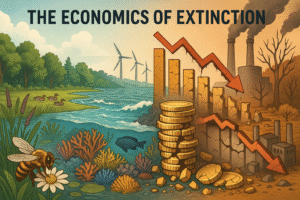In the intricate world of global economics, 2024 marks a year of significant challenges and profound realignments. As the World Bank forecasts the slowest half-decade of GDP growth in 30 years, nations worldwide, especially emerging markets, face a critical juncture. This first installment of our two-part series delves into the causes and implications of this slowdown, offering insights into the resilience and adaptability required in these turbulent times.
The Underlying Causes
- The Interest Rate and Inflation Balancing Act
Globally, economies grapple with the dual challenge of elevated inflation and higher interest rates. In a bid to contain inflationary pressures, central banks have resorted to interest rate hikes, inadvertently slowing down investment and consumer spending. This tightrope walk between curbing inflation and fostering economic growth underscores the delicate balance policymakers must maintain in 2024.
- Geopolitical Tensions and Trade Dynamics
Mounting geopolitical tensions, notably the Russia-Ukraine conflict, have not only disrupted supply chains but also heightened uncertainties in international trade relations. The global economy, while recovering from the risk of a recession due to the U.S. economy’s strength, continues to be threatened by these burgeoning geopolitical issues, adding layers of complexity to the already challenging economic landscape.
- The Shadow of the Pandemic
The world is still reeling from the socio-economic aftermath of the COVID-19 pandemic. While countries have largely moved past the immediate health crisis, the economic shockwaves continue to resonate, particularly in the form of reduced investment and lingering disruptions in global supply chains.
Regional Impacts and Responses
- Europe’s Prolonged Slowdown
The eurozone has been a leading contributor to the global economic slowdown, with major economies like Germany experiencing contractions in manufacturing production. This downturn has significantly impacted emerging markets with strong economic ties to Europe, such as Hungary and Poland.
- China’s Economic Headwinds
China’s economic slowdown, exacerbated by challenges in its real-estate sector, continues to influence the economic trajectory of the Asia-Pacific region. Despite a modest improvement in its near-term outlook, China’s subdued growth prospects pose significant headwinds for emerging markets, especially those reliant on Chinese consumption.
- Latin America’s Mixed Fortunes
Latin American economies present a varied picture, with some nations experiencing slowdowns and others showing signs of recovery. However, the region remains susceptible to the global economic climate, particularly the performance of the U.S. economy, which is a significant trade and investment partner.
Conclusion
As we navigate through these challenging economic waters, it is crucial to recognize the resilience and potential for adaptation within emerging markets. The next part of our series will focus on how these economies are responding to these challenges, exploring strategies for growth and stability in an era marked by uncertainty.
Author’s note: Stay tuned for Part 2 of our series, where we will delve deeper into the resilience of emerging markets and their strategies to weather the storm of global economic slowdown.
G.C., EcoSociosphere Contributor
References:
- World Bank. (2024). Global Economy Set for Weakest Half-Decade Performance in 30 Years. [online] Available at: World Bank Website.
- S&P Global. (2024). Economic Research: Economic Outlook Emerging Markets Q1 2024: Challenging Global Conditions Will Constrain Growth. [online] Available at: S&P Global Ratings.
- International Banker. (2024). Emerging Markets Expected to Remain Resilient in 2024 Amidst Global Economic Slowdown. [online] Available at: International Banker Website.
- World Bank. (2023). Sharp, Long-lasting Slowdown to Hit Developing Countries Hard. [online] Available at: World Bank Website.





Comments
I don’t think the title of your article matches the content lol. Just kidding, mainly because I had some doubts after reading the article.
Your point of view caught my eye and was very interesting. Thanks. I have a question for you.
Your point of view caught my eye and was very interesting. Thanks. I have a question for you.
Your point of view caught my eye and was very interesting. Thanks. I have a question for you.
Thank you for your sharing. I am worried that I lack creative ideas. It is your article that makes me full of hope. Thank you. But, I have a question, can you help me?